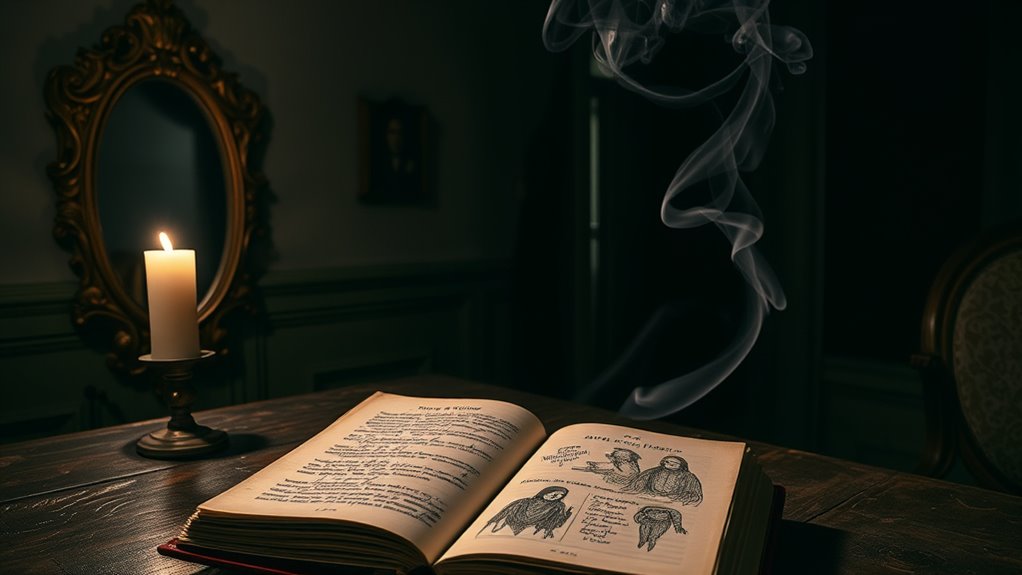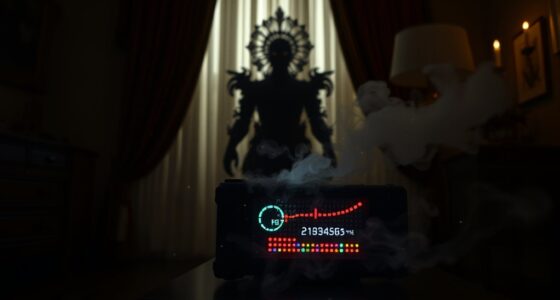Paranormal beliefs often stem from emotional coping mechanisms during grief or uncertainty. When faced with loss, you might feel a connection to deceased loved ones, helping ease existential anxiety. Cognitive biases also play a role, as they shape how you interpret everyday events. Plus, lower scientific literacy can make you more susceptible to accepting supernatural explanations. If you’re curious about how culture and media influence these beliefs, there’s much more to explore on this fascinating topic.
Key Takeaways
- Emotional coping mechanisms, especially during grief, drive many individuals to adopt paranormal beliefs for comfort and connection with deceased loved ones.
- Cognitive biases lead people to interpret ambiguous events in ways that reinforce existing paranormal beliefs, particularly when faced with uncertainty.
- Media portrayals of the supernatural, through shows and testimonials, normalize and amplify beliefs by making them more emotionally resonant.
- Lower scientific literacy correlates with a higher acceptance of paranormal beliefs, as individuals may struggle with critical thinking and trust in scientific explanations.
- Cultural narratives and folklore significantly influence perceptions of the supernatural, making vivid storytelling more persuasive than factual evidence.
Understanding the Prevalence of Paranormal Beliefs
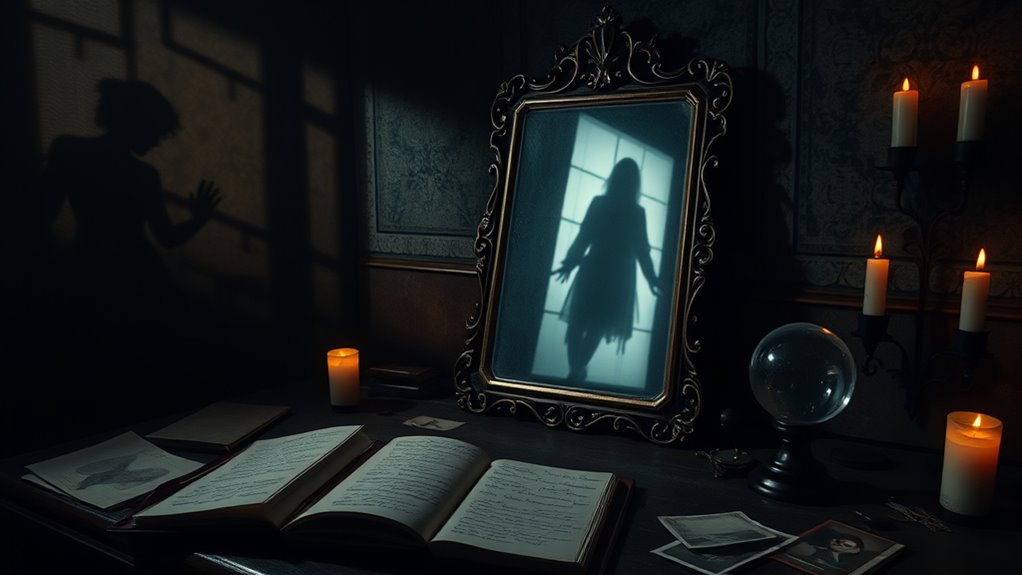
While many might dismiss paranormal beliefs as mere superstition, the reality is that a significant portion of the population actively engages with these ideas. Approximately 70% of Americans accept some form of interaction between the living and the dead.
This widespread belief in the paranormal, including a notable 46% who affirm ghosts’ existence, highlights a cultural fascination that transcends mere curiosity. Cognitive factors play a key role in shaping these beliefs, as personal experiences—like 44% feeling a deceased person’s presence—reinforce their validity.
Additionally, around 20% report receiving help from the dead, suggesting these beliefs fulfill emotional needs during grief. Understanding these psychological underpinnings reveals why paranormal beliefs resonate so deeply in society.
Psychological Mechanisms Behind Belief in the Supernatural
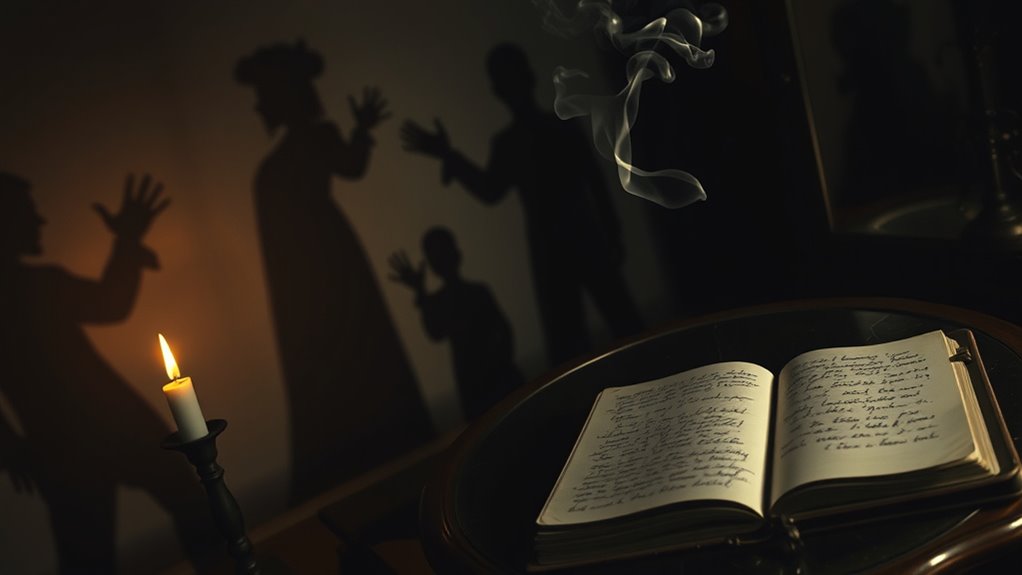
When you explore the psychological mechanisms behind belief in the supernatural, you’ll find that cognitive biases play a significant role in how you interpret everyday events.
Emotional coping mechanisms often drive these beliefs, especially during times of grief or uncertainty.
Additionally, media portrayals can shape your perceptions, making the supernatural feel more accessible and believable.
Cognitive Biases and Beliefs
Cognitive biases play an essential role in shaping your beliefs about the paranormal, often leading you to interpret random events as meaningful.
For instance, confirmation bias makes you seek out information that supports your existing paranormal beliefs while ignoring contradictory evidence. Weak reality testing can further blur the lines between real and imagined experiences, making supernatural explanations more appealing.
Studies suggest that you may show increased brain activity in areas linked to “theory of mind,” hinting at your tendency to attribute intention to chance occurrences.
Additionally, emotional responses to paranormal encounters can distort your memories, reinforcing beliefs over time. With a lack of cognitive inhibition, it’s easy to dismiss coincidences, deepening your belief in the supernatural.
Emotional Coping Mechanisms
Paranormal beliefs often emerge as emotional coping mechanisms that help you navigate life’s challenges, especially in times of grief or existential uncertainty. These beliefs provide a sense of connection with deceased loved ones, offering comfort during tough times. For instance, around 14% of Americans claim to have communicated with the dead, illustrating how paranormal experiences can validate emotional needs. Additionally, many cultures have rich traditions surrounding the supernatural realm, which can further reinforce these beliefs. Understanding the role of gaslighting tactics can also shed light on how individuals may seek solace in the supernatural when faced with emotional manipulation. Furthermore, the use of essential oils can enhance relaxation and promote emotional well-being, complementing these coping mechanisms.
Research shows that people experiencing brain fog may find a sense of clarity and connection through paranormal beliefs, which can help them cope with cognitive decline.
| Belief Type | Emotional Function | Example |
|---|---|---|
| Ghosts | Connection with the dead | Feeling presence of a loved one |
| Superstitions | Meaning in chaos | Rituals during traumatic events |
| Afterlife beliefs | Assurance and hope | Comfort in facing mortality |
Understanding the psychology behind these beliefs reveals how they shield you from harsh realities, making life’s uncertainties feel more manageable. Additionally, the use of essential oils for stress relief can enhance emotional well-being, complementing these coping mechanisms.
Influence of Media Portrayal
Although many people mightn’t realize it, media portrayals greatly shape your beliefs in the supernatural. Shows like “Ghost Hunters” and “Ghost Adventures” have normalized these beliefs by tapping into your fascination with the paranormal.
The trustworthiness of the investigators enhances the persuasiveness of their claims, making you more likely to accept them. Cognitive psychology suggests that these portrayals can spark your imagination, leading you to interpret everyday experiences as paranormal events.
Additionally, dramatic testimonials and credible appearances amplify the emotional impact, fostering acceptance of supernatural claims. For those with lower scientific literacy, such media portrayals profoundly influence social acceptance of these beliefs, reinforcing the idea that the supernatural is real and worthy of your consideration.
The Role of Scientific Literacy in Shaping Beliefs
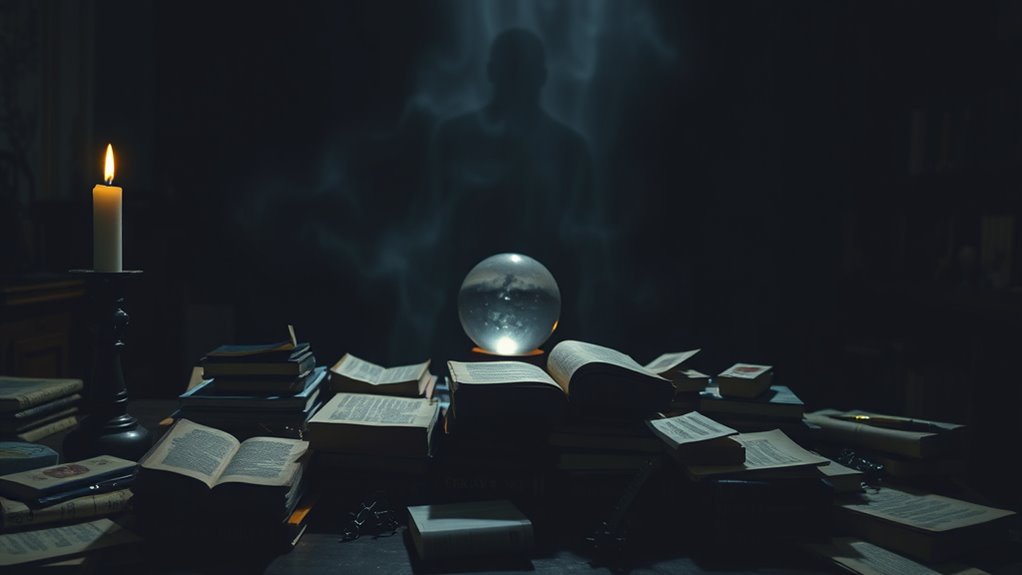
As you explore the intersection of scientific literacy and belief systems, you’ll find that a person’s understanding of scientific principles greatly influences their susceptibility to paranormal beliefs.
Individuals with lower scientific literacy often struggle with critical analysis, making them more prone to accepting supernatural explanations. This connection reveals a significant correlation between distrust in science and belief in the paranormal.
When you foster scientific understanding, you reduce the likelihood of falling prey to these beliefs.
Furthermore, confirmation bias plays an essential role; those who already believe in the paranormal tend to interpret ambiguous events as reinforcing their views.
Media Influence on Paranormal Perceptions
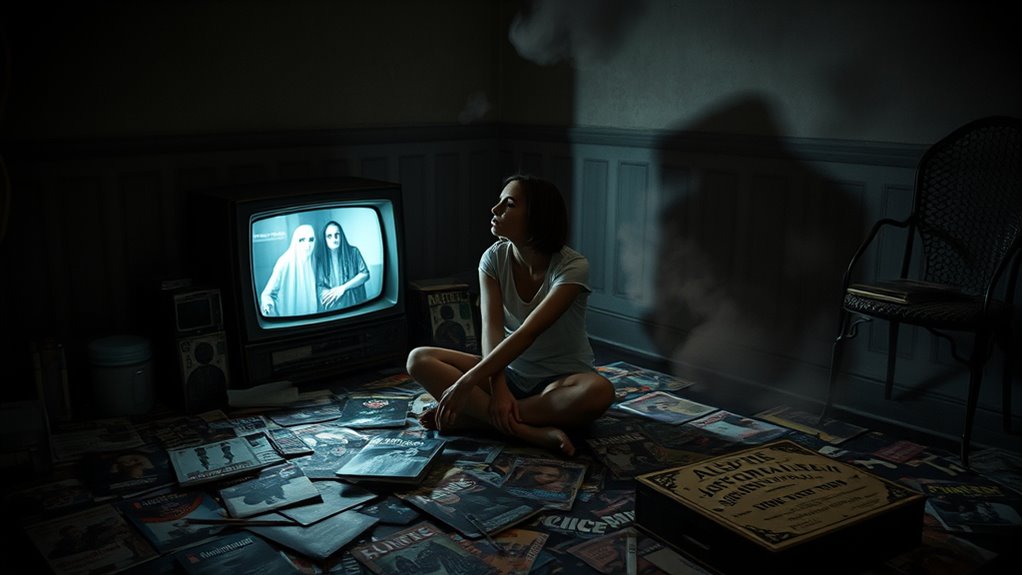
Media plays an essential role in shaping your perceptions of the paranormal. Non-scripted shows like “Ghost Hunters” and “Ghost Adventures” have normalized paranormal beliefs, making them more mainstream.
Cognitive psychology suggests that these programs enhance your imagination about spirits, which can lead to stronger beliefs in the supernatural. When you see trusted investigators confidently presenting paranormal claims, it influences your acceptance of those ideas.
Dramatic testimonials and credible appearances heighten the persuasiveness of these phenomena, molding public perception. As the media portrays paranormal beliefs more positively, it fosters greater social acceptance, encouraging you and others to express your own beliefs in the supernatural.
This media influence greatly impacts how you view and engage with paranormal concepts.
The Development of Paranormal Belief Scales
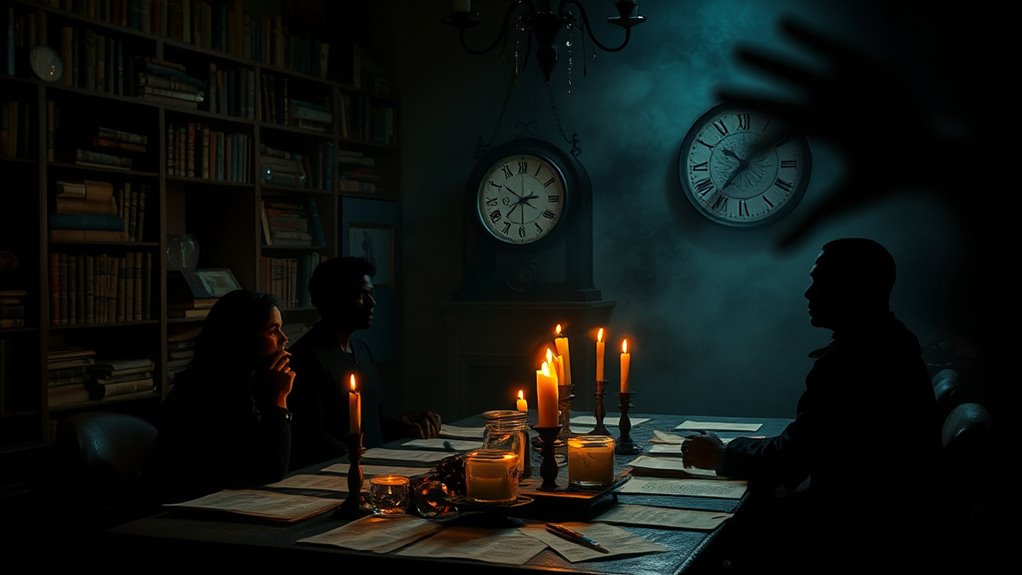
The widespread acceptance of paranormal beliefs, influenced by media portrayals, has prompted psychologists to develop more effective ways to measure these beliefs.
The Revised Paranormal Belief Scale (RPBS) is widely used but has faced criticism regarding its item content and factor structure. To address these concerns, researchers created a new scale featuring 13 items that show high reliability and validity.
They started with 29 items rated by 231 participants using a seven-point Likert scale, refining it through classical and modern test theory methods.
Utilizing modern test theory, like Rasch analysis, allows for detailed evaluations of item functioning and identifies differential item functioning across demographics, ultimately enhancing the scale’s validity and cultural inclusiveness.
Classical vs. Modern Test Theory in Measuring Beliefs
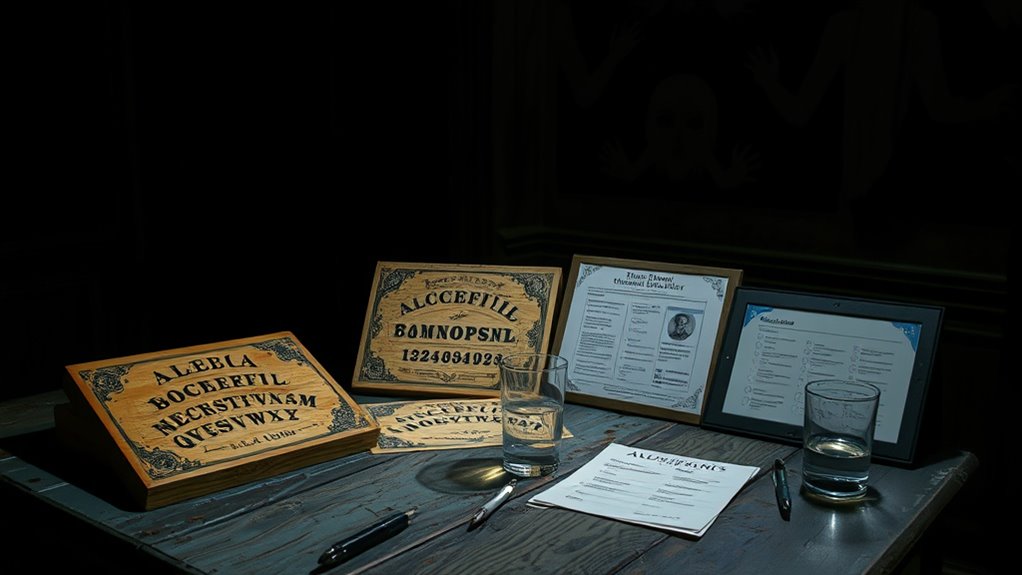
While both Classical Test Theory (CTT) and Modern Test Theory (MTT) aim to measure beliefs accurately, they approach this goal in fundamentally different ways.
Here’s how they differ in measuring paranormal beliefs:
- Measurement Precision: CTT assumes equal measurement precision for all individuals, while MTT focuses on individual item performance relative to latent traits.
- Scale Refinement: CTT reduced a paranormal belief scale from 29 to 14 items, whereas MTT refined it further to 13 items, enhancing reliability and validity.
- Differential Item Functioning: MTT assesses DIF, confirming the scale’s validity and revealing significant differences based on gender and age.
Demographic Factors and Paranormal Beliefs
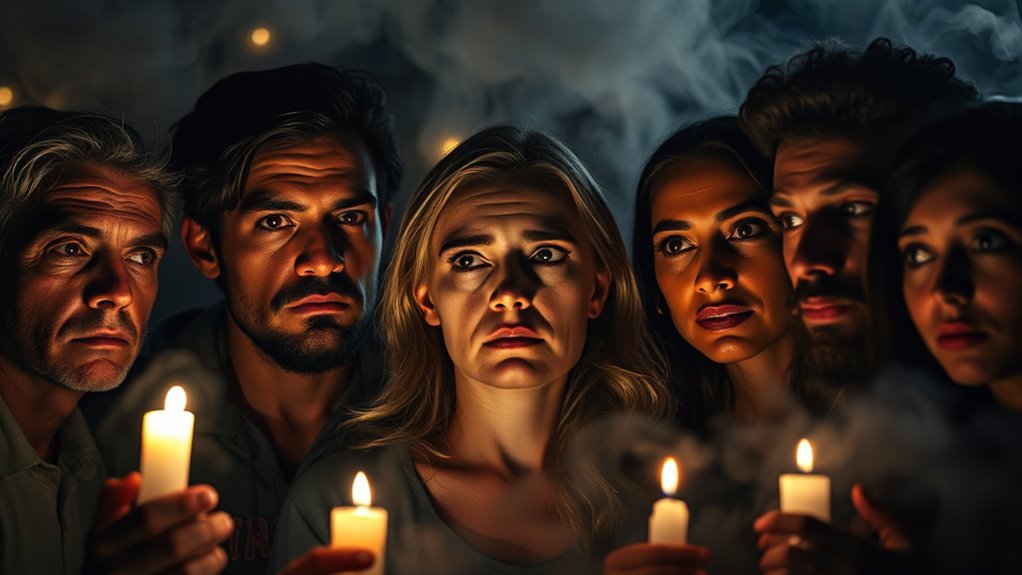
Demographic factors like age, gender, and education play an essential role in shaping your beliefs about the paranormal. Research shows that women generally report higher paranormal beliefs than men, and younger individuals often experience these phenomena more intensely. Additionally, lower scientific literacy correlates with a greater acceptance of supernatural claims.
| Demographic Factor | Influence on Paranormal Beliefs | Example Findings |
|---|---|---|
| Age | Younger individuals more likely | 44% of young Americans feel a deceased presence |
| Gender | Women score higher on beliefs | Women show stronger belief in spirituality |
| Education | Less formal education leads to more beliefs | Lower education correlates with higher paranormal belief |
| Cultural Contexts | Stronger beliefs in folklore-rich communities | Beliefs thrive in spiritual traditions |
Understanding these factors helps explain why paranormal beliefs vary across different groups.
The Adaptive Functions of Paranormal Beliefs

Paranormal beliefs can help you cope with grief by keeping a connection to loved ones who’ve passed away.
They also offer a sense of clarity and reduce existential anxiety, helping you make sense of life’s uncertainties.
Coping With Grief
When you’re grappling with grief, finding ways to cope can be incredibly challenging.
Paranormal beliefs often serve as a psychological balm, offering solace in times of loss. Here are three ways these beliefs can help you navigate your grief:
- Continued Connection: Many people report feeling a presence or receiving help from deceased loved ones, allowing you to maintain emotional ties.
- Emotional Clarity: Believing in the paranormal can provide clarity, helping you process trauma and loss more effectively.
- Existential Understanding: These beliefs offer explanations for death and the afterlife, easing the anxiety that often accompanies grief.
Reducing Existential Anxiety
Although life is filled with uncertainties, embracing beliefs in the supernatural can considerably reduce existential anxiety. Your belief in the paranormal can create a sense of connection to deceased loved ones, which is comforting during tough times.
This connection helps you process grief and provides a psychological buffer against harsh realities. When you attribute meaning to random events through these beliefs, you can reduce feelings of helplessness, particularly during chaos or trauma.
With around 70% of Americans believing in the interaction between the living and the dead, it’s clear that many find solace in these ideas. Cognitive biases also play a role, allowing you to interpret experiences as meaningful, ultimately easing the discomfort surrounding death and the afterlife. Additionally, dreams of deceased mothers may serve as a profound source of guidance, reinforcing the connection to those who have passed.
Enhancing Emotional Clarity
Believing in the supernatural can greatly enhance your emotional clarity, especially during challenging times. Many people find comfort in the belief in the paranormal, which serves as a coping mechanism.
Here are three ways it can help you:
- Maintaining Connections: About 70% of Americans believe in some interaction with the deceased, allowing you to feel closer to lost loved ones.
- Processing Grief: Engaging with paranormal claims helps you process feelings surrounding loss, enhancing your emotional clarity.
- Finding Meaning: Belief in the paranormal can provide a sense of control and understanding during chaotic situations, helping you make sense of your experiences.
In times of distress, these beliefs can considerably support your emotional well-being and resilience.
The Intersection of Culture and Supernatural Beliefs
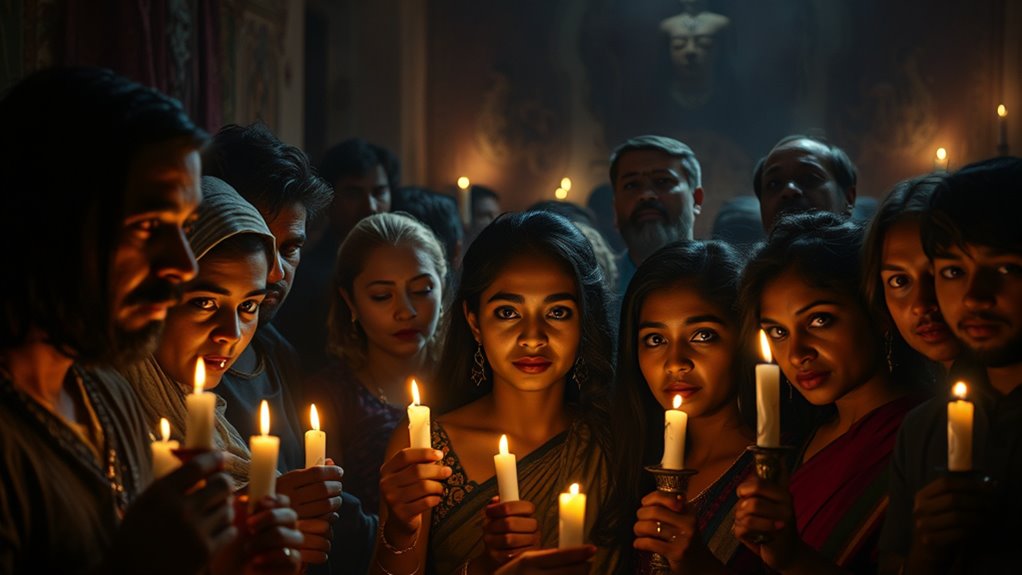
Cultural influences play an essential role in shaping how you perceive and interpret supernatural beliefs. Around 70% of Americans believe in some form of interaction between the living and the dead, showcasing a significant cultural phenomenon.
Cultural narratives and folklore, like ghost stories, deeply impact your understanding of the supernatural, varying greatly between societies. The media, through shows like “Ghost Hunters,” has normalized these beliefs, making them more socially acceptable.
Cognitive biases also come into play; you might see intention in random events, influenced by your cultural context. Ultimately, vivid storytelling resonates emotionally, often proving more persuasive than factual evidence, guiding how you and others embrace belief in the supernatural.
Frequently Asked Questions
What Causes Paranormal Beliefs?
Paranormal beliefs often arise from a mix of personal experiences, cultural influences, and emotional needs.
You might find yourself drawn to these beliefs when you seek comfort during tough times or when you encounter unexplained events.
Media representations can amplify your curiosity and imagination, making the supernatural feel more plausible.
Additionally, if you struggle with scientific explanations, you may be more inclined to embrace these beliefs as a way to make sense of the unknown.
Is There Any Scientific Evidence of Paranormal Activity?
There isn’t any solid scientific evidence supporting paranormal activity.
Most claims rely on personal experiences or anecdotes rather than rigorous testing. Studies often show that what you might perceive as supernatural events can usually be explained by psychological factors like cognitive biases or neurological phenomena.
Techniques aimed at detecting paranormal activity, like the ganzfeld experiment, typically fail to produce results beyond chance, leaving skepticism about the existence of the paranormal.
Conclusion
In traversing the complex landscape of paranormal beliefs, you uncover a tapestry woven from psychology, culture, and personal experience. Just as a compass guides you through uncharted waters, understanding the factors influencing these beliefs can help you find clarity amid the mysteries. Embracing scientific literacy and critical thinking equips you to discern fact from fiction, ensuring you stay grounded while exploring the intriguing domains of the supernatural. Remember, curiosity is your best ally on this journey.
